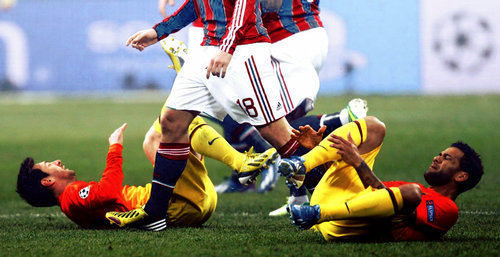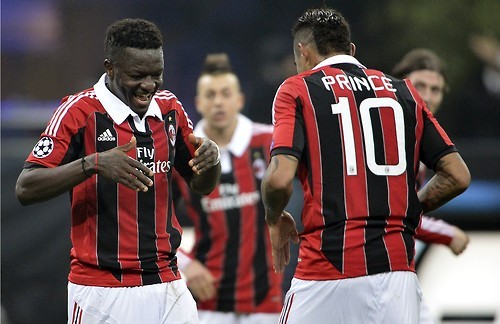New heroes rise in Milan, but what did they reveal?
New heroes rise in Milan, but what did they reveal?


They didn’t like being called the favourite. Barcelona almost always are these days, but something about AC Milan frightened them. Not so much the team, or its players, but the very thought of playing against Milan. Barcelona’s people spoke of their opponents in the round of 16 in the Champions League as if they were patron saints of the tournament. (And to some they are.)
But they came into Milan’s San Siro revering a familiar foe to such great extents. Milan’s history, their seven European titles, and their past performances against Barcelona — despite winning none of the seven previous games — intimidated them. Barca’s president, Sandro Rosell, didn’t feel relaxed. Xavi, too, speaking like a historian of the game, felt uneasy. “They have always made things difficult for us,” he told Sport.es before the game.
If Milan’s new team — only four of the team’s starters remained the same since the last time the two sides met — didn’t intimidate them, this idea of history did. Not what Milan are, but what they represent: a club demanding respect. Now, Bojan Krkic, the former Barcelona player, had at least said so: “Barca has the best in the world,” he told reporters, “but the San Siro commands respect.” So the visitors gave them every bit of it, maybe even too much. After all, it is Barcelona’s opponents who so often give too much respect. So often those opponents give up possession for the sake of defending.
The game on Wednesday started as they always do for Barcelona: in control. Within the first 10 minutes, they had already controlled their favourite statistic: possession, at 60%. But something was wrong. They passed and passed. Barcelona moved the ball about the pitch, contriving, scheming, looking for an opening. There wasn’t one. So they’d stall. Sergio Busquets, the midfielder, passed the ball back to Gerard Pique, who pushed it to Carles Puyol, who found Dani Alves, who returned the favour to Puyol.
They’d finally rush forward, but before they knew it, either Riccardo Montolivo, Milan’s tidy midfielder, had poked the ball free or Stephan El Shaarawy had raced all the way back to fetch it. Milan didn’t give Barca an inch of grass for free. There was a cost for time and space they were not used to. Barca made many of their passes as high up the field as the centre line, forced into neutral areas. Lionel Messi, a familiar presence in the penalty box, failed to touch the ball in that sinister area of his more than once. He was as mute as ever. Xavi, frustrated, shot a simple, surging shot from afar — a rare one, too, their only shot on target — that lost steam as it reached Christian Abbiati’s outstretched hands.
This team was flummoxed. Not every day do they see such tactical awareness from their opponents. The standard of defence in La Liga, to be sure, is not heroic, and in a season of such dominance in Spain — Barcelona had lost only twice in all competitions, maintaining a 12-point lead in La Liga all the while — it is peculiar how much Barcelona have struggled against foreign teams. But here were Milan, a cohesive bunch moving together, tracking back, sacrificing. Giampaolo Pazzini may not have made much of an impact on Victor Valdes, Barcelona’s stopper, but he was there to clear his own box, to boot the ball out and help a defence that had definitively parked in front of their goalkeeper.
Then the adventure began. Milan, for their confident resistance, could’ve gone on the same way in the second half, preserving a 0-0 draw. But they didn’t. There was a risk to take. There were goals that could have been in the opening 45 minutes — El Shaarawy lunged for a ball that curled into the box and kicked nothing but air — and so Milan attacked. And then they scored. And then again. They had the ball 27% of the time, yet had more attempts on goal than Barca.
The second goal, via Sulley Muntari, featured exactly the kind of novelty and patience of this Milan side that Barcelona may not have expected. M’Baye Niang, making his first Champions League appearance as a substitute, picked up a long, surging pass from Montolivo and drifted closer to goal from the right-hand flank. Niang, of 19 years of age, waited, then tossed the ball to El Shaarawy at the top of the box. The 20-year-old El Shaarawy paused, propped the ball up in the air, and dished a smooth pass to Muntari, who pumped a volley into the net for his first Champions League goal. The whole thing had the smell of a baby: of a newborn squad, of freshness — exactly the thing Andres Iniesta said his team lacked.
Milan beat Barcelona by two goals, the team’s first loss of such a margin in more than a year. They surprised us, and Barcelona, but maybe not themselves. Muntari praised his manager, Massimiliano Allegri, for breathing a sense of belief into a group of players that, we must remember, sat early in the season in 15th place in Serie A. These players have seen the lowest and the highest points of months of great change. They sold Zlatan Ibrahimovic and Thiago Silva. Mark van Bommel, Alessandro Nesta, Clarence Seedorf and Gennaro Gattuso all left for free.
These games against Barcelona could have easily struck Milan as a bonus to a trying year. But that Milan and Allegri took so much pride and poise into the tie is not so much a reflection of their defiance, but of their transformation, too. They have won 12 of their past 19 games in all competitions, and, most importantly, nine of their past 12 league matches to leap into third place — the last almighty spot to qualify for next year’s Champions League.
But if this result was an extension of an upswing in form, it was also a bit of an anomaly. The play of Boateng was extraordinary, but misleading. He ran beside Iniesta stride for stride, pestering the 28-year-old Spaniard with brutal regularity — his hands, feet, whatever he could use. His goal, a ferocious strike off a beneficial deflection, sparked his team’s offensive output. But this has very much been a season of disappointments for Boateng, and he played with the kind of heart, desire and undying commitment he has lacked from game to game. Pundits in England may chuckle that two former players of Portsmouth, a club buried underneath financial wreckage and at the bottom of the third tier of English football, scored against mighty Barcelona. But these two, Muntari and Boateng, have largely been ineffective all season, either through injury (Muntari) or relentlessly poor performances. Their stories can’t be told in this one game.

And maybe the same goes for the narrative of Milan itself. It’s never been as good as this result suggests. The season started under clouds of grey. Fans protested. Milan endured their worst attendance figures in the entire 27-year reign of Silvio Berlusconi. And yet on this night San Siro was packed. The Curva Sud, the south end of the stadium seized by Milan fans, unfurled a banner of Herbert Kilpin, the club’s founder in 1899. Pride, the very thing lost in the summer after all those departures, had returned like a distant relative. Mario Balotelli, the club’s new but inactive signing, jumped up and down on the sidelines, pushing his teammate Robinho around in celebration. Even the man once so glum in Manchester found his smile again.
From Barcelona, well, there was no whining. There was disappointment, but also pointed determination. Barca’s camp had always said the tie would be decided at Camp Nou. And it now will be. Assistant manager Jordi Roura is convinced his team can “turn this around.” Maybe they can. Up 4-0 on aggregate, Milan lost 3-0 to Arsenal in the return leg last year. As defending champion, they carried a 4-1 lead into Deportivo in 2004, and lost 5-4. Milan have let teams back in. But maybe a 2-0 lead is not big enough to invite complacency. Maybe Allegri really is the kind of manager that inspires confidence in his players, as they so often claim.
One thing is for sure: Barcelona will not be paying any respect to Milan any longer. They’ve left Milan humbled, and they’re focusing on themselves. But they also got what they wanted: they are no longer the favourite.
This piece was written by Anthony Lopopolo, a Serie A expert and regular contributor to AFR. You can follow him on twitter at @sportscaddy. Comments below please.







